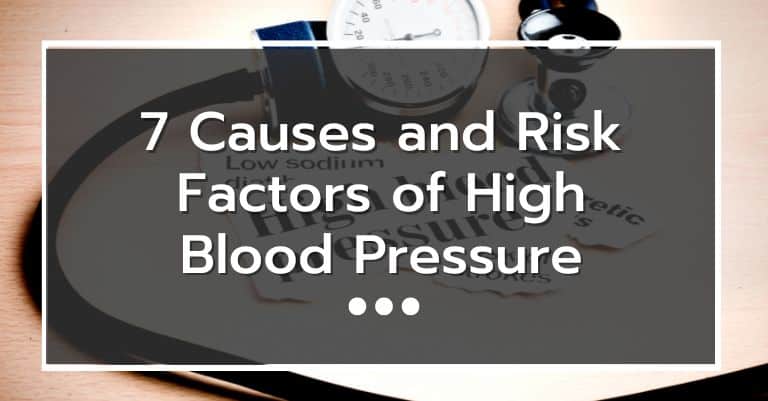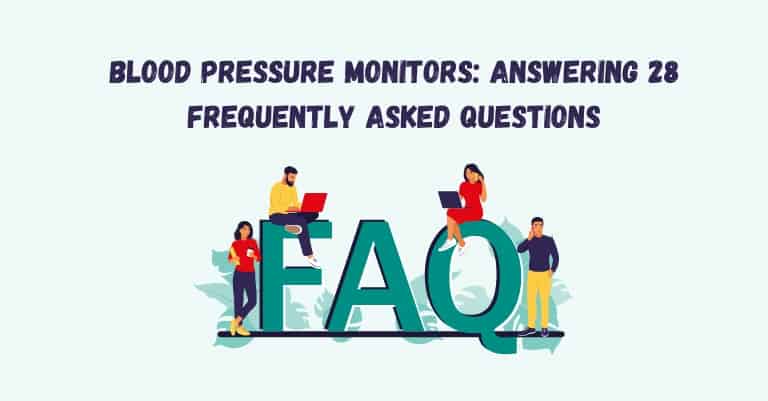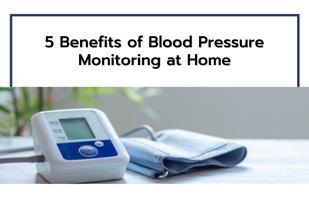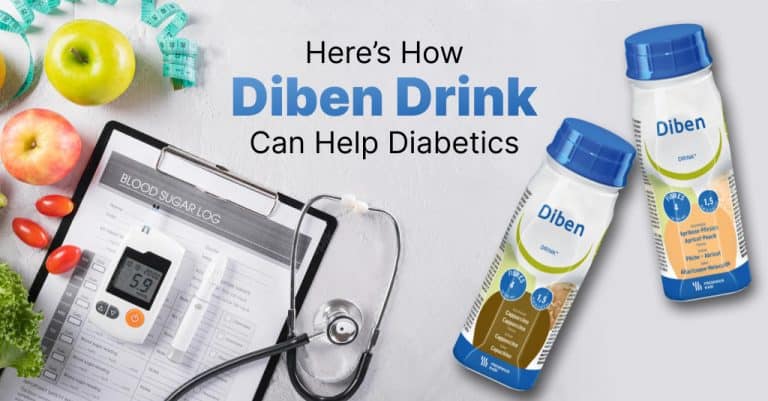Your Best Understanding Blood Pressure Guide (Hypertension high BP)
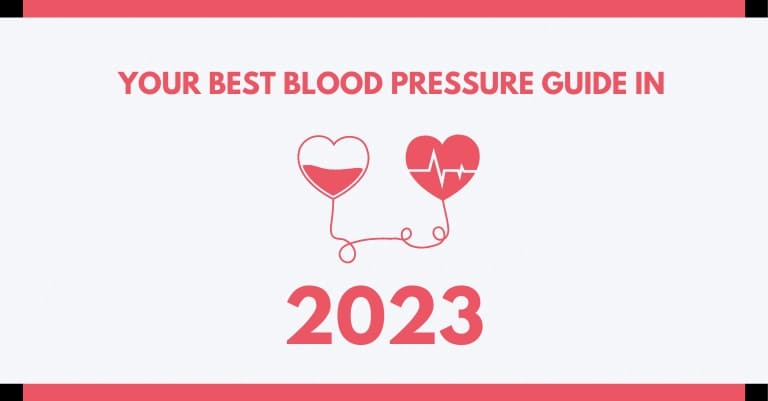
Remember the familiar swell of anger and the blood rushing to your head when you get mad at someone? And do you feel you are having higher blood pressure at the same time?
There’s some truth in that – your blood pressure may rise because of the sudden adrenaline. Blood pumps into your arteries when the heart works harder due to your lifestyle or underlying illness.

Our blood pressure may vary according to the level of physical activity (and inactivity), as well as our emotional states.
If you’re in a zenlike and peaceful mood now, your blood pressure is likely to be lower than the day before, when you were feeling stressed and on edge before a work presentation. Your blood pressure fluctuates accordingly to your mental, emotional and physical condition.

What Is Blood Pressure? How to read blood pressure monitors?
You’ve heard people around you talk about blood pressure, and you have a rough idea of what it means, but what is it exactly? Our amazing heart pushes blood throughout our circulatory system, and BP is mostly a result of this action.
Here’s a simple way to explain it: Blood pressure is a measure of the force of your blood pushing against the inner walls of the blood vessels, especially your arterial walls.
What Is Systolic and Diastolic Blood Pressure?
When we measure blood pressure, we use 2 types of blood pressure measurements: systolic and diastolic.
Systolic blood pressure refers to the blood pressure in the arteries that results when your heart contracts or beats blood out.
Diastolic pressure is taken when your heart relaxes in between each beat. Systolic pressure is when your blood pressure is at its highest, and vice versa for diastolic pressure.
What Is a Normal Blood Pressure and Pulse Reading By Age and Gender?
Blood pressure readings are expressed as a ratio of the systolic pressure over the diastolic pressure. The bottom number is the diastolic blood number while top is systolic number.
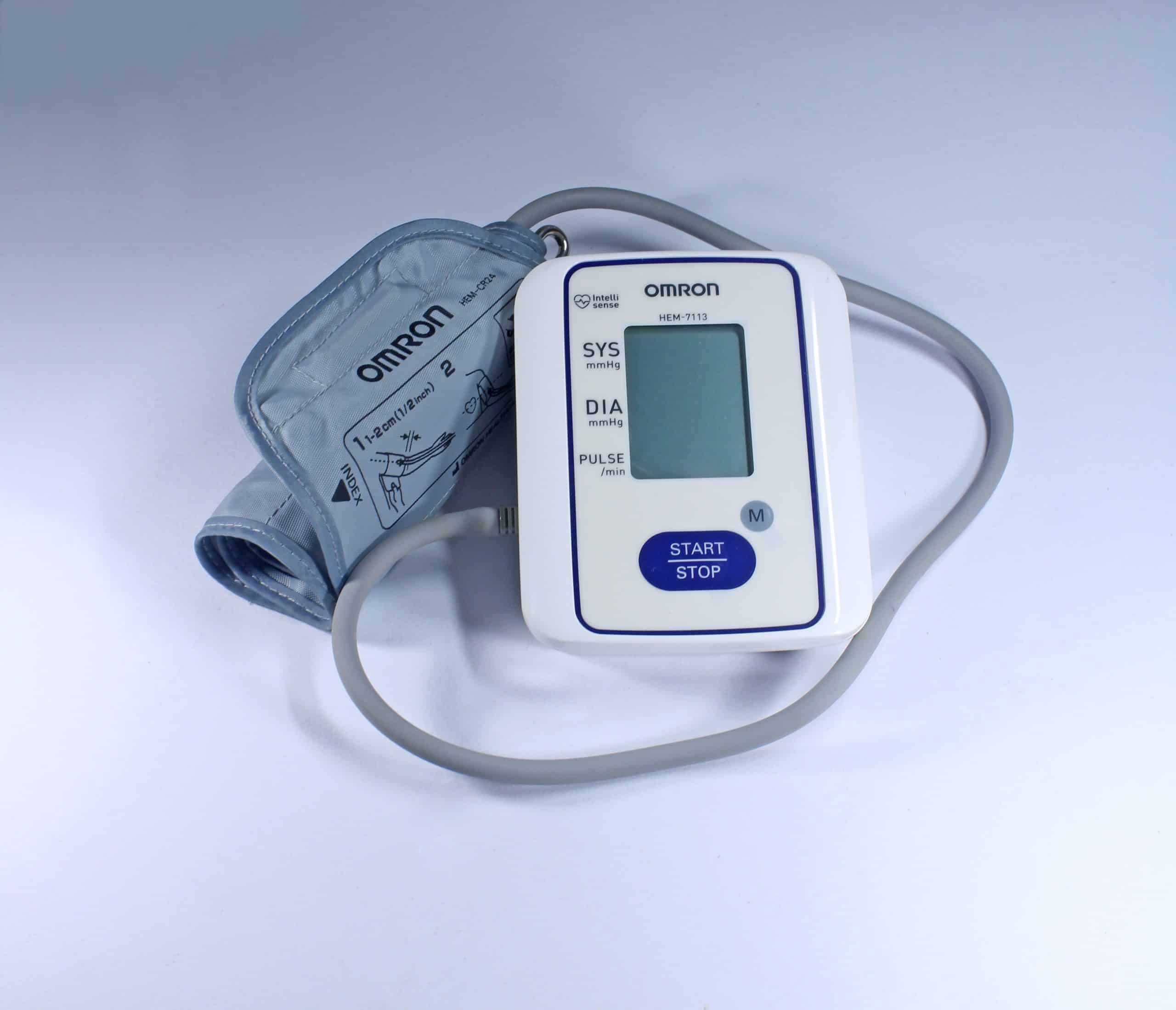
A healthy blood pressure level should be lower than 120/80 mmHg (millimeters of mercury). For example, a healthy young woman should have a reading between 90/60 mmHg and 120/80 mmHg.
The American Heart Association (AMA) recommends this blood pressure ranges from their national health survey:
| Gender | Age (Years) | Blood Pressure (SBP/DBP) |
| Male | 21 – 25 | 120.5 / 78.5 |
| 26 – 30 | 119.5 / 76.5 | |
| 31 – 35 | 114.5 / 75.5 | |
| 36 – 40 | 120.5 / 75.5 | |
| 41 – 45 | 115.5 / 78.5 | |
| 46 – 50 | 119.5 / 80.5 | |
| 51 – 55 | 125.5 / 80.5 | |
| 56 – 60 | 129.5 / 79.5 | |
| 61 – 65 | 143.5 / 76.5 | |
| Female | 21 – 25 | 115.5 / 70.5 |
| 26 – 30 | 113.5 / 71.5 | |
| 31 – 35 | 110.5 / 72.5 | |
| 36 – 40 | 112.5 / 74.5 | |
| 41 – 45 | 116.5 / 73.5 | |
| 46 – 50 | 124 / 78.5 | |
| 51 – 55 | 122.55 / 74.5 | |
| 56 – 60 | 132.5 / 78.5 | |
| 61 – 65 | 130.5 / 77.5 |
Here is a table of the healthy pulse readings by age:
| Age | Heart Rate (BPM) |
| Newborn Infant | 70 – 190 |
| 1 – 11 Months | 80 – 169 |
| 1 – 2 Years | 80 – 130 |
| 3 – 4 Years | 80 – 120 |
| 5 – 6 Years | 75 – 115 |
| 7 – 9 Years | 70 – 110 |
| 10 – 18 Years | 60 – 90 |
| 18 Years and Above | 55 – 80 |
Facts about Blood Pressure Monitor Readings Chart
Here is a blood pressure chart for a better understanding of the different blood pressure readings in adults aged 18 and above:
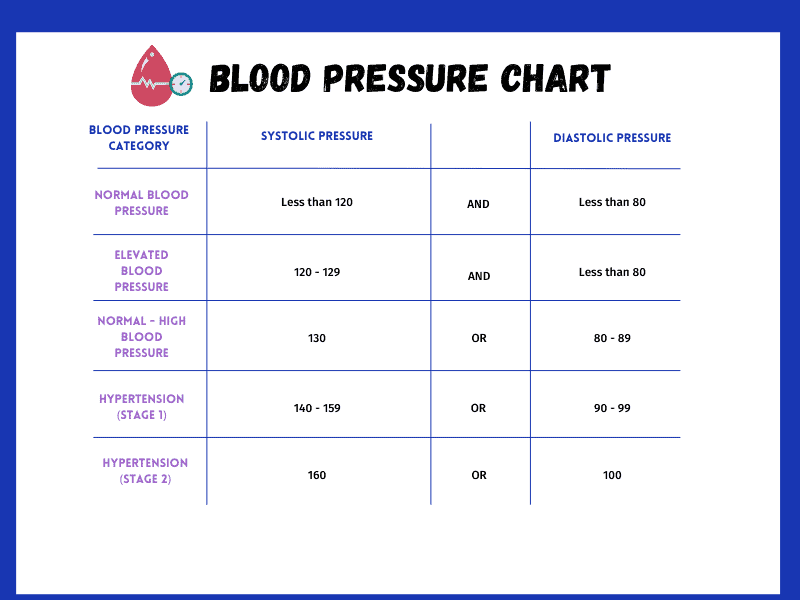
High Blood Pressure: What Should I Do If My BP Is 140/90?
A blood pressure of 140/90 indicates high blood pressure.
High blood pressure is a disease where your heart pumps blood into the arteries at a pressure that is higher pressure than what is normal or healthy.
When this happens, it is important to first understand more about this disease and its underlying causes before moving on to tackling treatment. According to the Ministry of Health and the Department of Cardiology at National Heart Centre Singapore, hypertension is the #1 leading cause of cardiovascular disease. Coronary heart disease accounts for almost one-third of all deaths in Singapore.
What Causes High Blood Pressure or hypertension?
There are 2 kinds of high blood pressure, primary and secondary hypertension.
In most cases of primary hypertension, the exact cause cannot be found. It tends to manifest over many years, but it is largely influenced by your lifestyle and diet.
Essential hypertension (primary) is more prevalent and occurs when your blood pressure is abnormally high but not as a result of a medical problem. Obesity, a family history of suffering from hypertension is present, and a poor diet is common causes of this. Marginally higher blood pressure at least is still reversible with medication and a change in lifestyle.
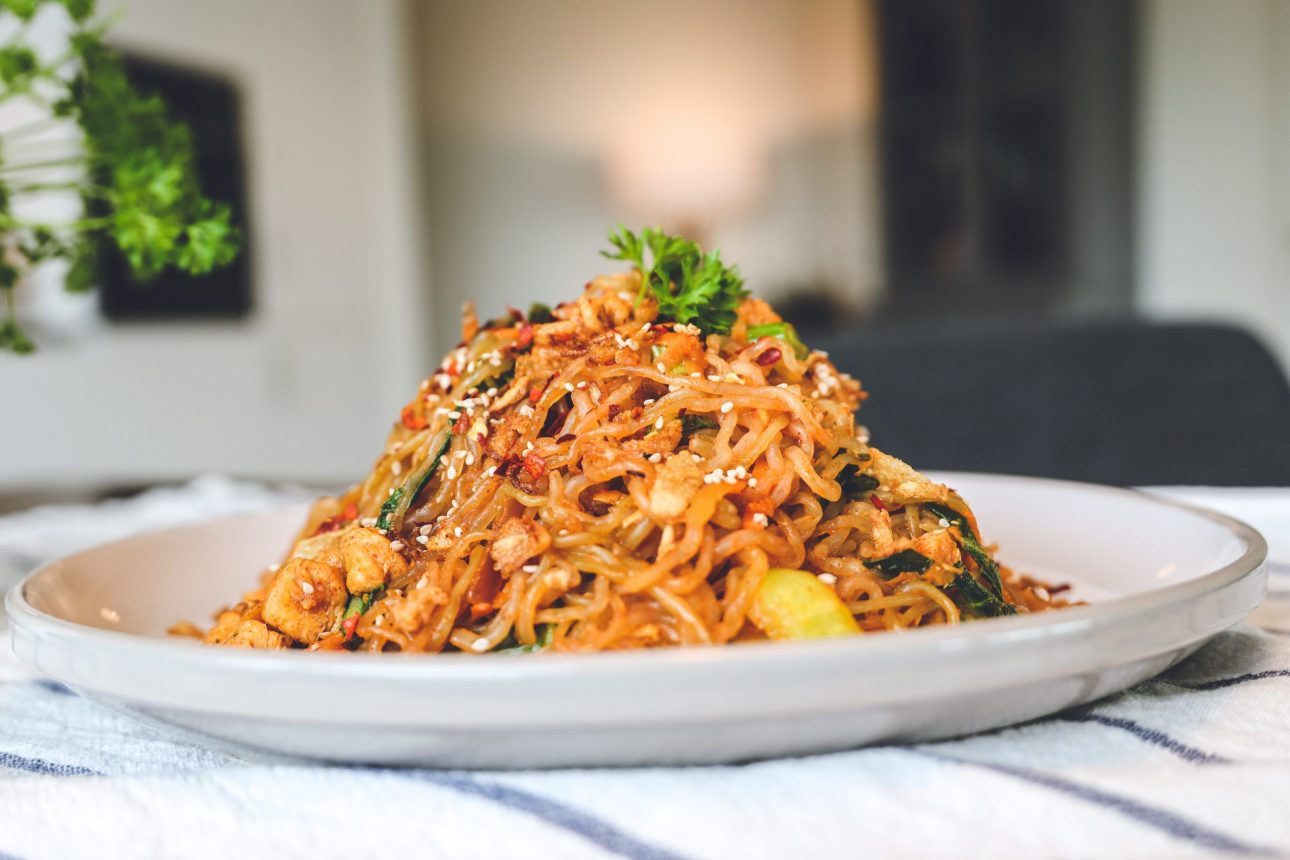
Secondary hypertension is the opposite – it refers to elevated blood pressure with a direct, identifiable cause.
Secondary hypertension is a diagnosis of high pressure when there is a clear direct cause. Primary and secondary can coexist; in particular, a new second cause should be taken into account when there is an immediate worsening where a person’s blood pressure is persistently high.
The following conditions can result in secondary conditions:
- Adrenal gland (hormone-producing glands situated on top of both kidneys) tumors
- Diabetes or kidney Disease
- Obstructive snoring. Sleep apnea
- Paraganglioma or pheochromocytoma.
- Pregnancy (preeclampsia) (preeclampsia).
- thyroid condition.
- Birth control medications
- medicines like NSAIDs.
- Illegal drugs (cocaine, amphetamines)
What Are the Risk Factors of High Blood Pressure?
There are a few risk factors for high blood pressure increasing your risk of developing it.
- Age (Year can influence blood pressure readings by as much as 30-40%)
- Race (especially common in people of some Asian sub groups)
- Family history (hereditary)
- Obesity (the more you weigh, the more blood your body needs, and the more force of the body’s blood pushing)
- Smoking (tobacco in cigarettes raises blood pressure and chemicals harm the lining of arterial walls)
- Pregnancy
- Inactivity
- Excessive sodium or fat in the diet (body retains fluid and blood pressure can increases)
- Excessive alcohol consumption (heavy drinking damages your heart)
- High levels of stress
- Some chronic conditions like sleep apnea and kidney disease
How Do You Feel When You Have High Blood Pressure?
You can get high blood pressure without knowing it because there may be no symptoms.
For some, these are some of the signs that high blood pressure will increase your risk:
- Serious headaches
- Nosebleeds
- Shortness of breath
- Fatigue
- Confusion
- Breathing difficulties
- Irregular heartbeat
- Blood in the urine
- Chest pains
- Vision issues
What Are the Side Effects or Complications of High Blood Pressure?
It can be dangerous when left untreated. Some known side effects or complications include:
- Heart attack or Stroke
- Kidney failure
- Vascular dementia
- Heart failure
- Sexual dysfunction
- Loss of vision
How can I manage high BP or bring down my blood pressure Down Immediately?
Unless your blood pressure is a result of a sudden emotional or activity change, it’s unlikely that you can bring it down immediately. However, you can take steps to reduce your blood pressure exerted over time.
Here are some ways to manage:
1. Get Fit More Frequently
If you’re a working adult, it can be difficult to find the time to exercise and work out, especially if you work OT all the time.
Sometimes, when you’re finally home for the day, all you want to do is crash in bed till the next morning.
However, there are plenty of misconceptions surrounding exercise – you don’t need to head down to your nearest gym and start working on heavy weights or using the treadmill.
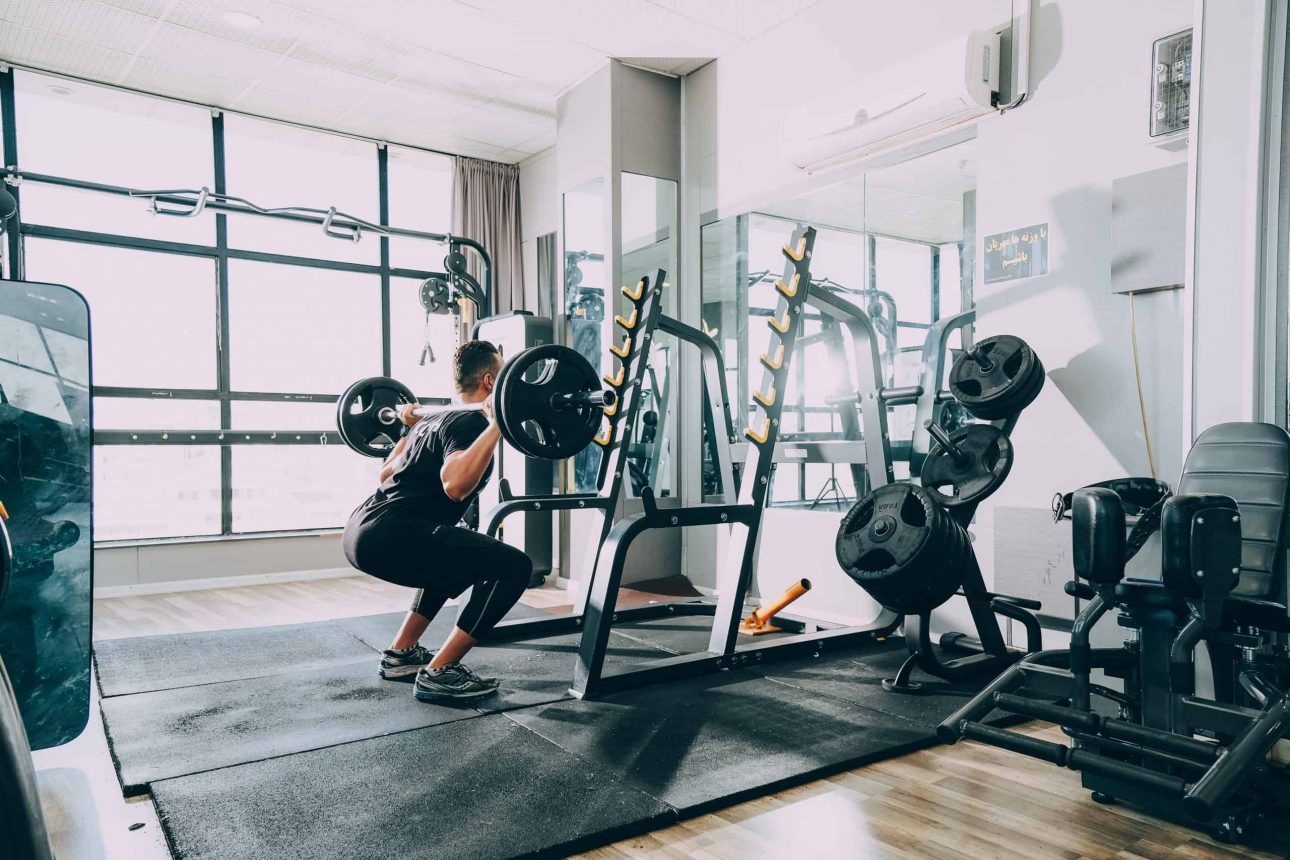
Choosing to walk that short distance home instead of taking a bus, climbing the stairs to your unit, cycling with the family on the weekends, or doing housework can all help.
2. Reduce Your Sugar, Salt, and Fat Intake
Your diet is often linked to your blood pressure.
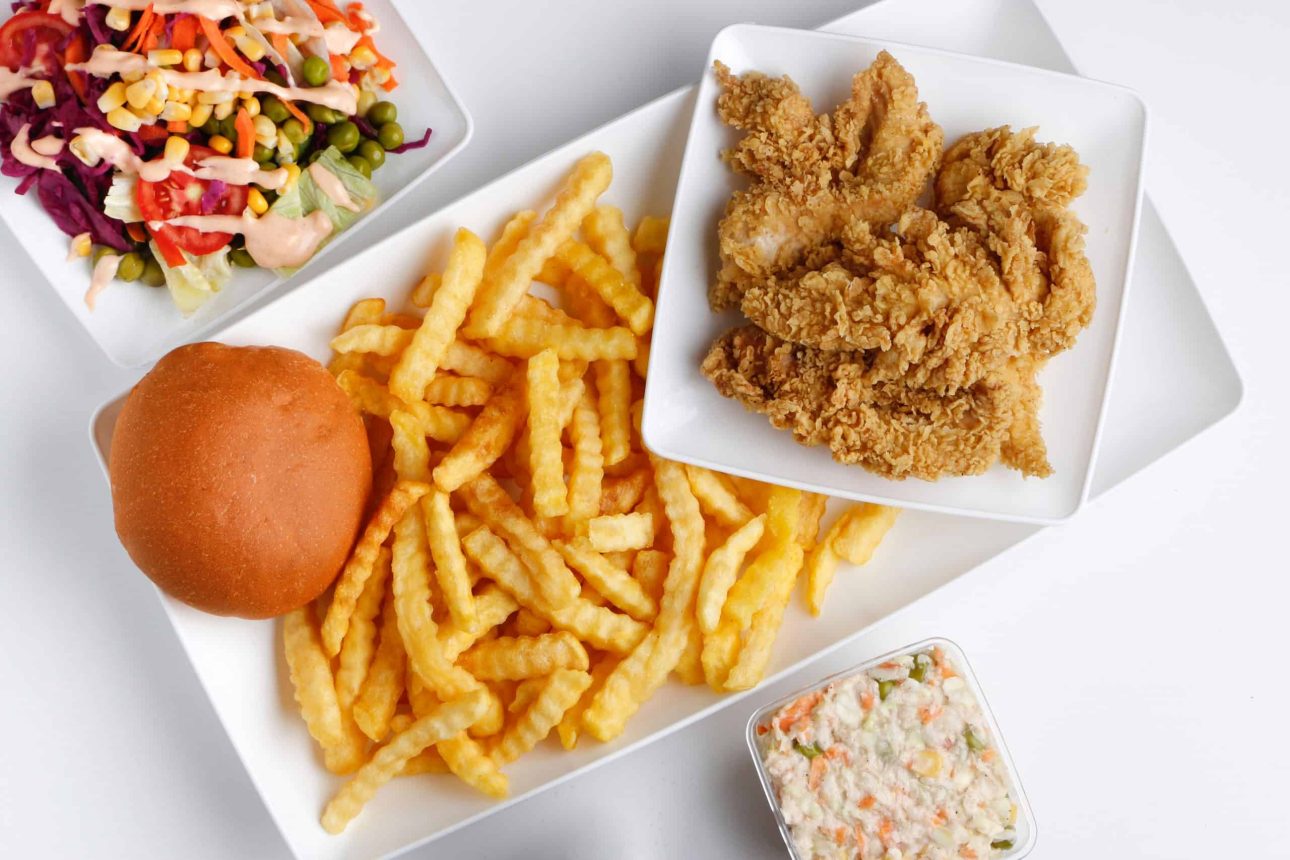
Resist the urge to grab that sugary donut or fried curry puff and replace them with healthier options or cut snacking out from your diet.
Sugar, particularly fructose, has been found to increase your blood pressure even more than salt. Reducing your sugar and salt intake is especially impactful for obese people in reducing diastolic blood pressure.
3. Reduce Your Stress
We get it – work and life can be stressful.
There are demands to be met in every aspect, from the expectations you place on yourself to your young children and ageing parents.
However, it is critical to find ways to lower your stress levels to improve your health.

Take note of the things that you can do to feel peaceful and calm. It can be squeezing in time to read your favourite book, a relaxing jog around the park, sweating it out in a sauna, having a massage, or having your foods high in fiber or health vitamins.
Find out more natural ways to reduce your high blood pressure here!
Low Blood Pressure
While high blood pressure is a cause for concern, the same applies to the opposite. In serious cases, this can be life-threatening. Generally, BP lower than 90/60 mmHg is considered low.
If you are a healthy young adult, it is not usually a big problem. However, it can signal an underlying problem for certain groups of vulnerable people, like the elderly.
Low blood pressure may lead to insufficient blood flow to the heart, brain, and other key organs, with the risk of developing complications.
What Causes Low Blood Pressure?
There are a number of reasons that may cause low blood pressure. They include:
- Dehydration
- Sepsis (a life-threatening condition) due to serious infection
- Extreme weight loss
- Pregnancy
- Blood loss
- Side effects from taking certain medications
- Heart problems (heart failure, abnormal heart rhythms)
- Liver disease
- Endocrine (hormone-related) problems
What Are the Symptoms of Low Blood Pressure?
Even though we don’t talk about low blood pressure as much as its counterpart, leaving your condition untreated can also pose a danger.
For example, it can raise your risk of fainting, cause organ damage, or even heart attack, which can be fatal.
What Are the Available Treatments for Low Blood Pressure?
Your doctor has to examine the cause of your low blood pressure measured before determining a suitable treatment.
Some medications may need to be stopped or require adjustment if they contribute to the condition. Sometimes, switching up your lifestyle can also have a great impact.
Blood Pressure Medications Hypertension BP
While you can take measures to reduce your high blood pressure, medication may sometimes be required for treatment of hypertension.
It is important to treat it early to prevent progression to more serious complications. There are many types of medication available, including drugs called antihypertensive.
They are categorized into different groups with different functions and side effects.
Here are some for uncontrolled hypertension:
- Diuretics (help the kidneys get rid of excess salt and water)
- Beta-blockers (block chemical action that triggers your heart, allowing it to pump slower and softer)
- Angiotensin-converting enzyme (ACE) inhibitors (help narrowed vessels expand)
- Angiotensin II receptor blockers (ARBs) (work similarly to ACE inhibitors)
- Calcium channel blockers (prevent calcium from entering muscle cells of the heart and vessels)
- Alpha-blockers
- Vasodilators (help relax the muscles of blood vessel walls, particularly in small arteries)
How Can I Check My Blood Pressure at Home With a Blood Pressure Machine?
Buying your own blood pressure monitor allows you to check your blood pressure in the comfort of your home where your devices are readily available.

The ideal time to measure your blood pressure is when you are in resting conditions state.
Here are some tips to help you take the measurement:
- Position yourself comfortably (for example, in bed or in your favourite chair)
- Prop your left arm on a table such that it is identical to the level of your heart
- Stay still and avoid making big, jerky movements
- Wrap the arm cuff smoothly and securely around the upper part of your uncovered arm
- measure at various times of day to get an average.
Check out this guide to know more about understanding your blood pressure monitor readings!
How Do You Choose the Best Blood Pressure Monitor in Singapore?
There are plenty of reputable brands that carry blood pressure monitors in Singapore. There are Omron, Yuwell, Panasonic, RossMax, Xiaomi, and Tensoval Mobil. There are also in-house brands by Guardian or Watson, cheap basic models.
With the abundance of choices, and the importance of accurate readings, which is the best brand and model you should get?
One world-renowned brand is Omron, a global leader in digital BP monitors with more than 200 million sold to date. Headquartered in Tokyo, Japan, it distributes its products to customers in over 74 countries.
Some of its most popular blood pressure monitor models are:
- OMRON HEM-7121 (upper arm monitor) the basic model to buy for home use
- OMRON HEM-7120 (upper arm) if you have a tight budget
- OMRON HEM-7600T (upper arm) you love best value for money
- OMROM HEM-7130L (upper arm monitor)
- OMRON HEM-7361T (upper arm monitor) you want the best healthcare at home
- OMRON JPN500 (upper arm monitor)
- OMRON HEM-6161 (wrist monitor)
If you’re buying yours for the first time, it can be confusing to distinguish between the different models. Luckily for you, we’ve compiled a useful guide that any first-time buyer can easily use to choose an Omron blood pressure monitor.
You can also refer to this overview that compares the different monitors:
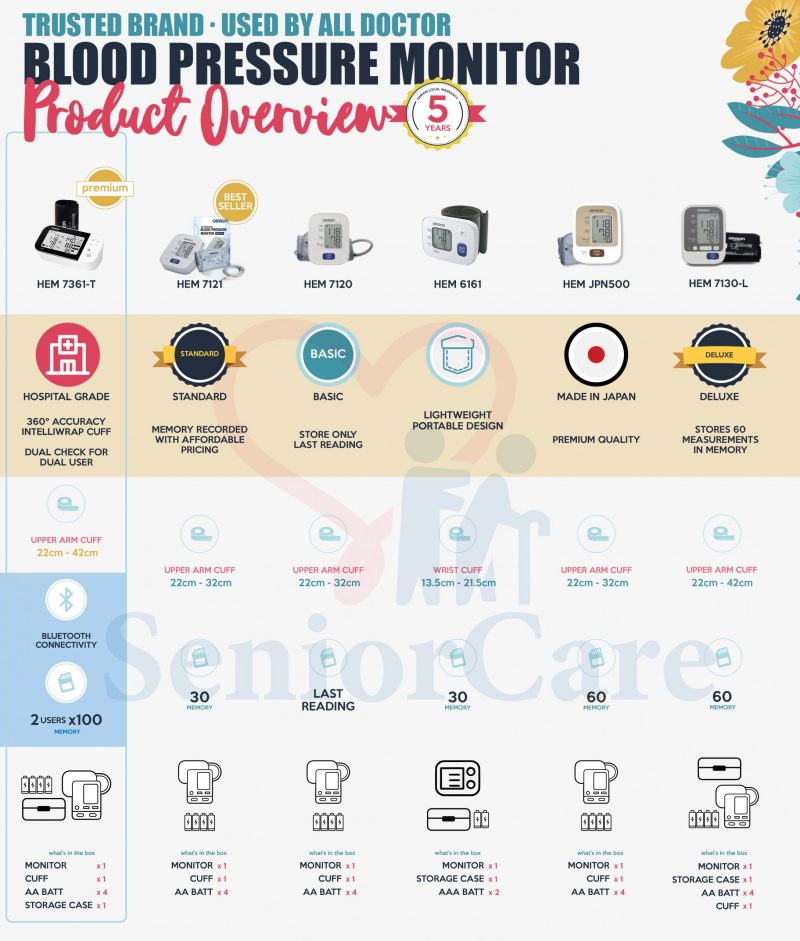
Buying a blood pressure monitor for use at home gives you plenty of advantages! Find out some of the benefits of blood pressure monitoring at home here.
Where Can I Buy My Omron Blood Pressure Monitor in Singapore?
There are a number of places where you can buy your Omron blood pressure monitor in Singapore. For example, you can get them at your nearest Guardian, Unity, or Watsons store. You can also find them at hospital pharmacies, clinics, polyclinics, and the Omron Service Centre. However, you will not be able to find them at supermarkets like Cold Storage, NTUC FairPrice Finest, Giant, Sheng Siong, or Market Place by Jason’s.
For convenience, you can buy your Omron blood pressure monitor on the SeniorCare website, where SeniorCare sells everything your elderly loved one needs. SeniorCare also has a presence on Shopee, Qoo10, Amazon Singapore, and Lazada e-commerce platforms.


